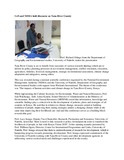| dc.description.abstract | Tana River County is set to benefit from outcomes of various research findings which are to inform its policy planning processes in eco-tourism management, conflict resolution, education, agriculture, fisheries, livestock management, strategic environmental assessment, climate change adaptation and mitigation, among others.
This was revealed during a national scientific conference organized by the National Environment Management Authority (NEMA) and the University of Nairobi, Department of Geography and Environmental Studies with support from Wetlands International. The theme of the conference was ‘The impacts of human activities and climate change in Tana River County, Kenya.’
While representing the Cabinet Secretary for Environment, Water and Natural Resources, Prof. Judi Wakhungu, Amb. Julius Kandie, Senior Director of Administration at the Ministry of Environment, Water and Natural Resources (MEWNR) noted that information, knowledge and scientific findings play a critical role in the development of policies, plans and strategies of all counties in Kenya. He said that in relation to climate change, measures aimed at building resilience of people, improving their coping strategies amidst a changing climate while at the same time improving their livelihoods are vital and this conference serves as a building block towards this goal.
Prof. Lucy Irungu, Deputy Vice-Chancellor, Research, Production and Extension, University of Nairobi, noted that “there is need to link research to policy formulation in order to transform the livelihoods of people, in line with Kenya Vision 2030”. In her opening remarks presented by Prof. William Ogara, Director, Center for International Programmes and Links, University of Nairobi, Prof. Irungu stressed that there is underutilization of research for development, which is hampering progress towards promoting development. Prof. Irungu expressed commitment of the University of Nairobi working with Tana River County and other development agencies in addressing various societal needs and challenges experienced in the county.
On his part, H.E. Amb. Hussein Dado, Governor, Tana River County, asserted that in order to plan effectively, research data was crucial as a basis of making informed decisions. According to the Governor, Tana River County had in the past few years come face to face with unprecedented challenge of climate change impacts and corresponding socio-economic losses to communities. Climate change is a threat to the achievement of sustainable development and poverty reduction goals and priorities.
Tana River County has rich biodiversity which includes wildlife, birds and mangroves, among others. The county has a population of over 240,000 people with 76.9% of the people living in poverty. The main socio-economic activities undertaken in the county include farming, livestock rearing, mining of sand in Bura, tourism at Kora National reserve, Arawale National Reserve and Tana Primate National reserve. The county has three major fishing landing sites. Tana River is the largest river in the country and supports communities in the area. Some of the challenges that the county faces include land degradation, destruction of forests, human and wildlife conflict, overgrazing, uncoordinated development and overexploitation of resources.
The conference brought together stakeholders from academia, NEMA led by the Director General Prof. Geoffrey Wahungu, public and private sector and civil society from various parts of the country and internationally, actively engaged in research, innovation, production, packaging and application of environmental and climate change management. | en_US |

